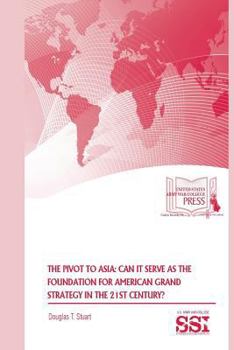The Pivot to Asia: Can it Serve as the Foundation for American Grand Strategy in the 21st Century?
The Obama Administration deserves credit for assigning top priority to the Indo-Asia-Pacific (IAP) region; nonetheless, the President has faced serious problems in his implementation of the "pivot to Asia" strategy. This monograph begins with a discussion of the instruments of national power that were available to the Obama Administration in support of the pivot strategy. Since the United States was much stronger in terms of military resources than it was in terms of diplomatic, informational, and economic resources, the Obama Administration opted to build its pivot strategy on the foundation of the so-called San Francisco network of military relationships with regional friends and allies. The San Francisco system is impressive in terms of its military capabilities, its flexibility, and its adaptability, but it is also burdened with some defects. The most serious flaw is that it is geostrategically top-heavy, with two anchor points in Northeast Asia (South Korea and Japan) and a much less developed infrastructure of bases and troop concentrations throughout the rest of the Western Pacific and Indian Ocean. Dr. Douglas T. Stuart notes that the vast size and complexity of the IAP region has made it impossible for the United States to pursue a one-size-fits-all pivot strategy. Rather, the Obama Administration has had to develop policies that resonate with the specific interests and concerns of each regional friend and ally. Not surprisingly, Washington has had mixed success in its efforts to recruit support among IAP governments. To illustrate this point, Dr. Stuart draws upon remarks by regional experts who are contributors to a recently published volume by William Tow and Douglas Stuart, eds., The New US Strategy Towards Asia: Adapting to the American Pivot (New York: Routledge, 2015). Virtually all of these experts express some doubts about America's ability to sustain the pivot strategy over the long term. This monograph then focuses on U.S.-China relations, with particular emphasis on debates among representatives of two schools of thought: - "Containers," people who are inclined to focus on worst-case scenarios and favor the explicit or implicit containment of China. This group is criticized for risking a "self-fulfilling prophesy"; and, - "Adapters," people who argue that Washington must make room for China, both in the region and in the world. These individuals are criticized for "self-deluding optimism." Dr. Stuart also discusses the arguments of "Game Changers," those who challenge the assumption that China will continue to rise as an economic and military power. In a situation in which the Obama Administration cannot make a definitive choice in favor of one of these schools of thought, it has opted for a policy of "hedging" in order to keep its options open. Unfortunately, it is a comment on the tragic nature of international relations that hedging policies are likely to be interpreted negatively by the target of such actions-thus moving both nations closer to what Graham Allison calls the "Thucydides Trap." Dr. Stuart recommends certain policies that may make this unwanted development less likely. The final section of this monograph looks beyond the Western Pacific, noting the growing importance of India and Beijing's efforts to expand its influence into Central Asia, Europe, Africa, and Latin America. Dr. Stuart also discusses the problems that the Obama Administration has been forced to confront in other countries, such as Ukraine, Libya, and Syria among others that have complicated its efforts to keep the U.S. focus on the pivot strategy in the IAP region. Dr. Stuart concludes with some lessons for strategists, derived from the Obama team's experience with the pivot.
Format:Paperback
Language:English
ISBN:1537479253
ISBN13:9781537479255
Release Date:January 1
Publisher:Createspace Independent Publishing Platform
Length:88 Pages
Weight:0.28 lbs.
Dimensions:0.2" x 6.0" x 9.0"
Customer Reviews
0 rating





